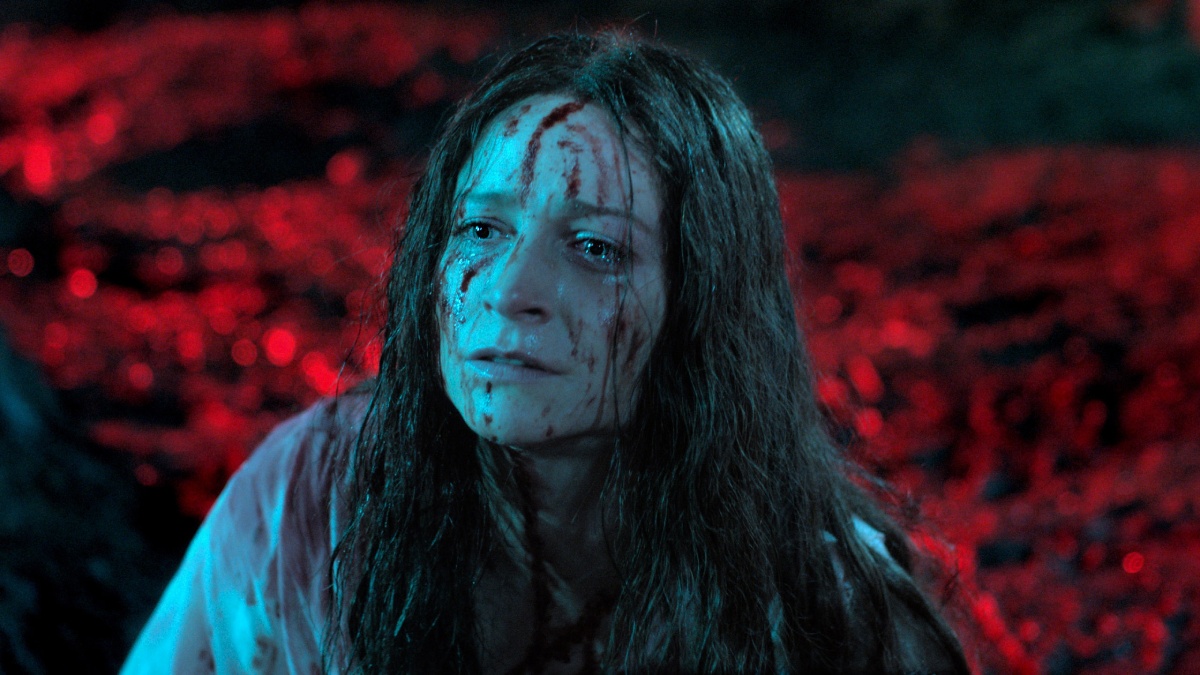If the people censoring inappropriate images out of films are there to protect the people from unnecessary horrors, who protects those protectors? In the new ‘80s-set, blood-soaked thriller, “Censor,” the answer is clearly no one. But thankfully, for audiences at least, the descent into madness of one film censor after witnessing a particularly violent “video nasty” is quite the enjoyable, utterly disturbing affair.
READ MORE: 25 Most Anticipated 2021 Sundance Film Festival Premieres
Directed by first-time feature filmmaker, Prano Bailey-Bond, who co-wrote the film with Anthony Fletcher, “Censor” is a throwback to an era of censorship-overreach, banned VHS tapes, and an overly-concerned public that believed violent films would be the end of humanity as we know it. The feature follows the story of a 1980s UK-based film censor, Enid (Niahm Algar), who subjects herself daily to the most violent and horrifying images in an attempt to deem what is and isn’t appropriate for general consumption. But when one particularly horrible movie triggers a flashback to a traumatic event in Enid’s past, the straight-laced woman begins to question what is real and what isn’t, as her friends and family watch her spiral out of control.
READ MORE: The 25 Most Anticipated Horror Movies Of 2021
Enid is a strong, independent woman; there’s no doubt about that. But over the course of Algar’s restrained but powerful performance, all of the strength and professionalism on the surface is revealed to be a mask for what truly lies beneath those amazing ‘80s costumes—a traumatized woman that has never forgiven herself for the disappearance of her sister when they were both young girls. Through little tics and slight breaks in her stoic expressions, Algar presents hints at what is really going on without spelling it out for audiences. Scenes where she is fastidiously picking at her cuticles, straightening her shoulders, and even putting on her gleefully large glasses all take on new meaning as you realize that her subtle OCD rituals are the only thing keeping her sane.
Thanks to the craftsmanship of Bailey-Bond, all you need to know about Enid’s deteriorating mental state is seen in the way the film changes techniques over the course of the taut 84-minute run-time. Perfectly positioned shots with drab, muted ‘80s offices and costumes slowly give way to more erratic camera movements and bright colors as the film begins to embrace the style of the video nasties that are being critiqued. The interstitials embracing the boxy aspect ratio and graininess of those gory VHS tapes also help to homage the era while subtly blurring the lines of what is actually going on.
READ MORE: 52 Films Directed By Women To Watch In 2021
And while Enid is a meticulous and thoughtful worker, always striving to get it right and not release something too controversial, it’s when she has her first major failure in her job that really sends her over the edge. “Censor” demonstrates that not even the most diligent, caring editor is a match for the power of trauma on the brain. As Enid’s mental illness takes over, we are reminded how the brain is our defense mechanism from pain, often eliminating terrible memories from our past so that we can move on in our present lives. But the full extent to which the brain can defend someone from painful memories is really where “Censor” comes to life in the final act.
As Enid gets closer and closer to perhaps finding out the truth of her sister’s disappearance all those years ago, her defensive mind kicks into overdrive, presenting a final scene that is one of the more cleverly-edited and upsetting moments in recent memory. And in doing so, Bailey-Bond is able to tip her cap to the disturbing ‘80s VHS nightmares while also echoing the work of David Lynch, trusting the audience will appreciate ambiguity and style over needless exposition.
Unfortunately, when you think the filmmaker is going to fully embrace the vulgar and obscene analog video horrors that she has teased throughout the picture, “Censor” holds back enough to make you feel just slightly unsatisfied. Sure, there is one great scene of body horror and a few bits of exciting gore. And the Lynch-ian ending is very effective. But after an hour of build-up, teasing the shocking, over-the-top imagery that can be found on that particular haunting grain of magnetic VHS tape handed out in discreet paper bags, Bailey-Bond stops short of scratching that itch and restrains herself, as if Enid herself was in charge of the final cut.
That said, “Censor” is an impressive, visually-stunning, deeply disturbing debut from Bailey-Bond and a showcase for Algar, who gives a truly spectacular performance. It’s a film that fuses sensibilities, allowing you to fondly remember the illicit era of scuzzy, potentially dangerous VHS tapes from your teenage years while also presenting a thoughtful character study that tickles the mature part of your brain. [B+]
Follow along with all of our coverage of this year’s Sundance Film Festival here.





